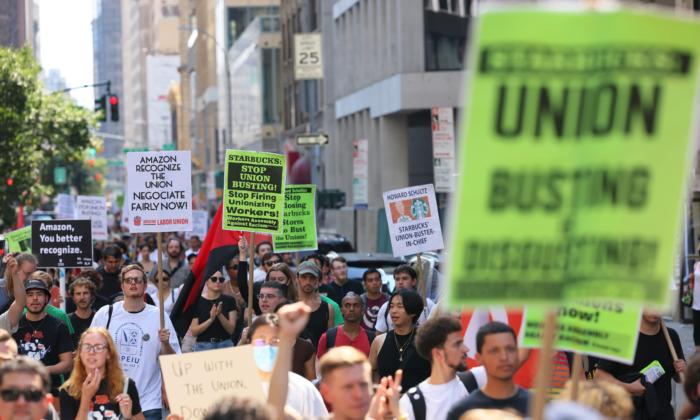The Biden administration’s National Labor Relations Board (NLRB) tossed out Trump-era employer standards in a ruling that makes it harder for businesses to have rules that make it difficult for their employees to unionize.
The board adopted a new legal standard for judging whether a rule violates Section 7 of the National Labor Relations Act, or the right to form, join, or assist labor unions and collectively bargain.
Employers will need to “narrowly tailor its rules to only promote its legitimate and substantial business interests while avoiding burdening employees rights,” though an employer can “rebut the presumption that a rule is unlawful by proving that it advances legitimate and substantial business interests that cannot be achieved by a more narrow rule.” The new standard applies retroactively.
Previously, the standard set by a 2017 Boeing case and 2019 LA Specialty Produce Co. categorized certain work rules as “always lawful,” and the board found this to be overly broad, resulting in a “chilling” effect on employees.
Board member Marvin Kaplan, a Trump appointee, wrote the lone dissent, pointing out that the new standard would make a work rule unlawful if “an employee could reasonably interpret [it] to have a coercive meaning,” being overly broad in considering the likelihood of employees’ interpretations.
Do Workers Want Unions?
F. Vincent Vernuccio, senior fellow at the Mackinac Center for Public Policy and the center’s director of labor policy between 2012 and 2017, told The Epoch Times that the pro-union rules coming from the administration aren’t necessarily in the interest of workers, or even wanted in many industries.“What you’re seeing come out of the NLRB and the DOL [Department of Labor], and frankly multiple non-labor agencies, are trying to push unionization on workers that don’t want it,” he said. “You’re seeing the Biden administration have what they call a ‘whole of government approach’ to increased unionization.”
There is a broad push for unionization in industries that weren’t using it before, and people who work for themselves and chose not to be an employee, but there hasn’t been increased interest in unionization from the workers’ side, according to Mr. Vernuccio.
“I think a big reason you don’t see workers scrambling to unions is that unions are still in this industrial revolution one-size-fits-all, antiquated business model that frankly doesn’t translate to the modern workforce,” he said. For example, typical union contracts may negotiate wage ceilings instead of floors.
“[Workers] want flexibility. They want to be rewarded for how productive they are, how hard they’ve worked, and those are things that are not in a typical union contract,” he said. “And unfortunately what you just see is unions doubling down on the one-size-fits all collective bargaining agreements of the past.”






Friends Read Free